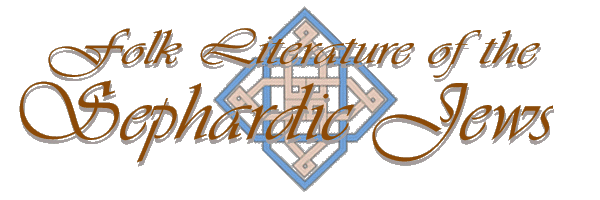Oral Literature of the Hispanic World
Samuel G. Armistead, Faculty Research Lecture, 1998, University of California, Davis
Dedication and Acknowledgments
The Nature of the Pan-Hispanic Ballad
The 700-Year Oral Tradition of the Pan-Hispanic Ballad: A Case Study
Enter Judeo-Spanish: A Living Matrix of Pan-Hispanic Ballad Traditions
Medieval Epic and the Ballad: An Example
The Invention of Tradition: A Case of "False Memory"
Creative Cultural Fusions: "Orientalizing" the Ballad Melody
The Nature of the Pan-Hispanic Ballad
And now, to the business at hand: What I would like to do today is to talk a bit about our project, its history, how it began, what we have tried to do, what we are discovering and the significance of what we have found, and also what a great experience, what a great adventure, it has all been. Over half a century ago--and isn't that awful--, when I was an undergraduate at Princeton, I enrolled in an introductory course on Medieval and Golden Age Spanish literature. Among the required readings was an excellent anthology of Spanish ballads. This highly distinctive form of poetry immediately attracted my attention.
Ballads are strange things. To appreciate them, to like them, is definitely an acquired taste, something like eating snails or truffles. As you can see on your handouts, this is very compact, telegramatic, highly allusive--and highly elusive--poetry; poetry which implies much, much more than it actually says. Ballads have an intuitive style. Ballad poetry impels the reader--or rather the listener--to become part of the poetic process, to imagine, to participate actively, to supply the narrative context, the background, the subsumed details, in a word, to collaborate in the poem's artistic creation. Medieval hearers, listeners, to oral poetry, knew ballads just as well as the singers--the audience and the singers were one and the same. Everyone involved knew the smallest narrative details and was sensitive to the special codes of traditional poetry. As 20th-, almost 21st-century people, these poetic codes, in some instances, no longer work for us and, consequently, ballad texts sometimes now seem impenetrable.
Ballads are seemingly very simple poems; we like to say this is "primitive" poetry, the poetry of country bumpkins and rural illiterates; but, actually, these are very complex things, their intertextuality, their resonances with innumerable other songs in the same regional repertoire, are surprisingly intricate. And they are also very successful poetic creations in their own right. So ballads are very much a world unto themselves and not, initially, to be easily understood. Nor are they to be taken lightly. They concern, once you capture their drift, an impressively diverse, astoundingly wide range of human experiences and emotions, covering everything from the very best, the most noble, the most heroic sentiments to the most ominous and the most hateful: So we have ballads of steadfast love and devotion, of total fidelity, but also of the most blatant infidelity; we have ballads of amorous adventures and erotic fantasies and also of the tragic misfortunes of unrequited love; we have ballads of the husband's return from war or from captivity; of the unfortunate, mistreated wife; of the evil mother-in-law; of tricks and deceptions; of treachery and betrayal; and of other, darker things still: of rape and abduction; incest and infanticide; murder, mayhem, and bloody vengeance. Such topics and such characteristics are, of course, shared by Hispanic ballads with the ballad traditions of other European peoples and to explore these neglected, pan-European relationships has also been very much a part of our project.

 Software development and hosting is currently provided by the
Software development and hosting is currently provided by the